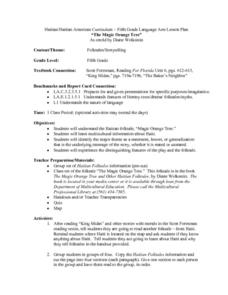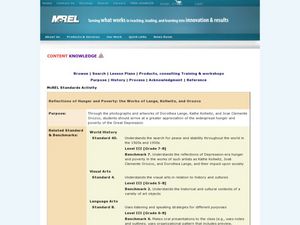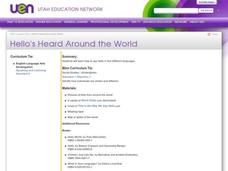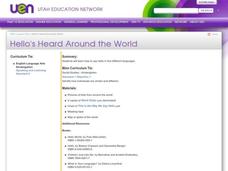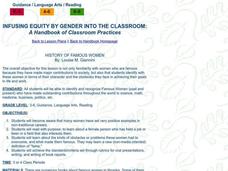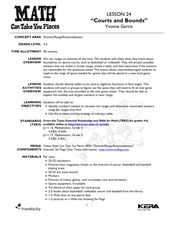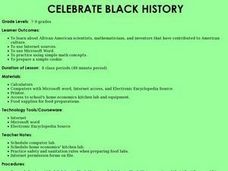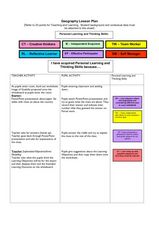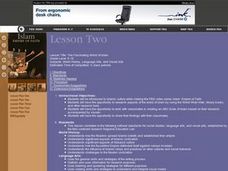Curated OER
Religion: Great Schism Debate
Students examine the Great Schism in the Roman Catholic Church and research the positions of the three popes. The three groups research their popes' positions and then hold a debate. Students write position papers about the Great Schism.
Curated OER
Religion: Eastern Schism Debgate
Students, debate the Eastern Schism in church history. They divide into four groups as Christians debate iconoclasts and the open debates the patriarch. Students debate the use of icons in religion and who has supreme authority over...
Curated OER
Researching an Author
Students research works by a contemporary author of their
choice, choosing one in particular upon which to focus, conducting research
relating to that work. They create a brochure utilizing Microsoft Publisher then share their brochure...
Curated OER
Exemplary Plans, Engineer It!
Young scholars research tall buildings and identify the geometric shapes used in the construction of the buildings. They compare shapes and infer why some are better than others in building. They produce a multimedia presentation of...
Curated OER
Million Dollar Project
Each student is given the task of spending $1 million. The way students spend their money is dependent on a theme such as "creating a dream world," "taking a trip," or "doing something to better society." Each student researches,...
Curated OER
The Pirates of the Caribbean
Third graders participate in a demonstration lesson that shows a map of the Caribbean Islands. They examine a natural resource that each island is known for. Next, they listen to a read aloud of Gail Gibbons, "Pirates: Robbers of the...
Curated OER
Math: Perimeter, Area, and Volume
Eighth graders discover how to compute the perimeter, area, and volume of different objects. With partners, they find and calculate the perimeter , area, and volume of 10 items each and exchange information. Students compile their...
Curated OER
The Magic Orange Tree
Fifth graders provide examples of folktales and their themes. They define a moral and give an example of a moral of a story. They read the story "The Magic Orange Tree" a Hatian folktale. They discuss events of the story and complete a...
Curated OER
Reflections of Hunger and Poverty: the Works of Lange, Kollwitz, and Orozco
Students explore the Great Depression depicted in artwork. In this interdisciplinary lesson, students analyze artwork by Dorothea Lange, Kathe Kollwitz, and Jose Clemente Orozco. Students create brochures that feature details regarding...
Curated OER
Introducing Biodiversity
Young scholars investigate biodiversity by creating reports with their classmates. In this ecosystem instructional activity, students utilize the Internet to research the different types of life in our environment and different...
Curated OER
Nonprofits Are Necessaary
Students research community nonprofit organizations. They identify their purposes and graph them. The search telephone books, websites, and magazines for information on local organizations. They write in journals how nonprofit groups...
Curated OER
"Hello's" Heard Around the World
Students demonstrate how to say hello in five different languages. They discover the many differences in the way students speak across the world.
Curated OER
"Hello's" Heard Around the World
Students say hello in five different languages (Spanish, Swahili, French, Portuguese, and Japanese). They are introduced to the countries of these languages (Mexico, Tanzania Africa, France, Brazil, and Japan).
Curated OER
History of Famous Women
Students explore famous women who have made contributions to the world.
Curated OER
Where Do You Live?
Second graders study and compare rural, suburban, and urban communities. They play a board game, read books about communities, and complete several other activities regarding the different types of communities. Several extension and...
Curated OER
One Grain at a Time
Students investigate deserts. In this geography lesson, students create a KWL chart about deserts and research information on deserts by using reference books. Students record the characteristics of deserts and the wildlife which lives...
Curated OER
Frontier Life Story
Young scholars explore American frontier life. In this history lesson, students participate in a series of activities that challenge them to discover what pioneer life was really like.
Curated OER
The Egyptian Cinderella
Students create a play of their own version of the Egyptian Cinderella. In this Egyptian Cinderella lesson plan, students work in teams to produce their own videotape version of the story.
Curated OER
Courts and Bounds
Students relate what they know about boundaries on sports courts to explore range of space. In this domain and range lesson, students identify numbers needed to calculate ranges and use the problem solving strategy of making a table.
Curated OER
Parts of Speech: Active Verbs
Students use White Fang to help them study active verbs. In this grammar lesson, students define active verbs and find examples in the the novel White Fang. Students then use ProQuest to research a place they'd like to visit. Students...
Curated OER
Celebrate Black History
Students research African-American mathematicians. In this middle school mathematics lesson, students celebrate Black History by conducting Internet research on an African-American, mathematicians or scientist. Students...
Curated OER
Geography Lesson Plan
Students examine the history of the Aborigines. In this Australia lesson, students research selected websites and print materials regarding the lives of the Aborigines and create posters that showcase their findings.
Curated OER
The Fascinating World of Islam
Students participate in viewing the PBS video series Islam: Empire of Faith. They research aspects of the world of Islam by using the internet and other research tools. They create, in groups, an ABC Book of Islam based on their research.
Curated OER
Sign Language
Students create short video tutorials on various American Sign Language signs. This lesson is a six-day project that begins with internet research and ends with student self-evaluations of project results.







